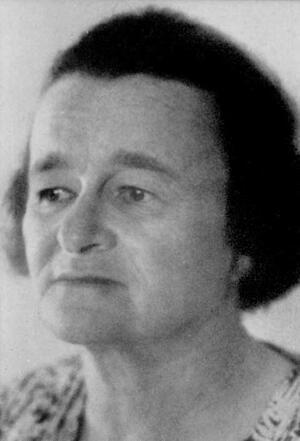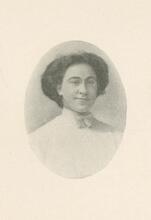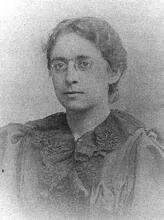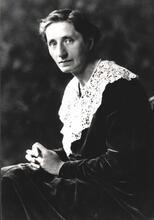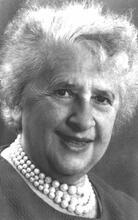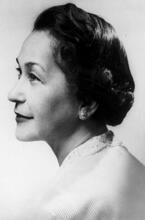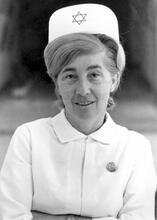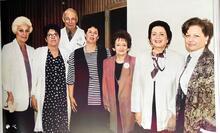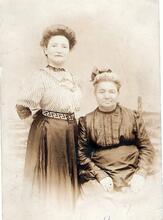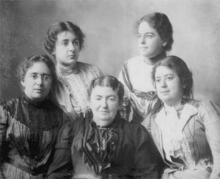Sidonie Wronsky
Sidonie Wronsky was among the pioneers of professional social work and one of the early social work educators. She began her career in Germany, leading the Archives of Social Welfare, where her direction marked the countless public initiatives in the wake of the Bismarck reforms and the increasing engagement of Jews. Wronsky was also a member of several social work organizations and taught at German schools, all the while writing extensively on issues such as Jewish social work and Zionist women’s movements. She emigrated to Palestine in 1933 and participated in the beginnings of social work education in her new home country, where she died in 1947.
Sidonie Wronsky (Siddy) is among the pioneers of professional social work and one of the early social work educators. In spite of her remarkable accomplishments and contributions, particularly in the area of the developing social case work as one of the traditional practice methods, she has not received as much publicity as some others in similar roles. She began her career in Germany and was one of the founders of social work education in Palestine.
Early Life
We know very little about her family of origin and her private life. The family lived in Berlin and can be described as assimilated. Her father, Max Moses Neufeld, was born in 1850 and died 1931; the years of birth and death of her mother Thekla, née Kleinmann, are not known. Wronsky was born in Berlin on July 20, 1883, the second of seven children. While the family did not observe Jewish rites regularly, education seemed to be of high value.
Career
Wronsky became a teacher in 1903 but extended her studies to special education. During several years of teaching handicapped children and very practical work, she became involved in larger organizational social issues. In 1908 she became director of the Archives of Social Welfare (“Archiv für Wohlfahrtspflege”), a section of the Center for Social Issues (“Zentrale für private Fürsorge”) in Berlin. This Center, much like a clearing house for the collection of materials and the coordination of booming social services, was established in 1893 and is now the German Central Institute for Social Issues (“Deutsches Zentralinstitut für soziale Fragen—DZI”— http:www.dzi.de), a research institute and library with a wealth of materials.
The importance of Wronsky’s leadership in this Institute can hardly be over-estimated. It marked the creation of countless private and public social initiatives and institutions in the wake of the Bismarck reforms and partly as the result of Jewish engagement and emancipation. Beside her administrative functions as director of the Archives and until her dismissal in 1933, she was engaged in many other functions.
From 1920 Sidonie Wronsky was a board member of the German Association of Public and Private Social Services (“Deutscher Verein für öffentliche und private Fürsorge”)—an umbrella institution that encompasses virtually all social services in Germany. The Central Jewish Welfare Agency in Germany (“Zentralwohlfahrtsstelle der Juden in Deutschland—ZWST”), founded in 1917, was part of this central and influential coordinating body for social concerns. She also became a board member of the ZWST and thus turned more directly towards her religious roots.
Wronsky is regarded as a representative of reform-oriented and politically critical social work. Having witnessed the social conditions of Jews from Eastern Europe and the foundation of the “Jewish Volksheim” in the “Scheunenviertel” of Berlin, she became more alligned with Zionism. She not only joined the Po’alei Zion movement of Jewish Social Democrats but was elected chairperson of the German Association of Women Zionists (“Bund zionistischer Frauen Deutschlands”).
In 1917 she was invited to teach at the school of social work that Alice Salomon had established in 1899, and in 1925 she was asked to join the teaching staff of the German Womens’ Academy (“Deutsche Akademie für soziale und pädaogische Frauenarbeit”). In preparation for, and as a result of, her teaching she published extensively, alone and in cooperation with others, in many different areas: the history of social welfare; Jewish social work; Zionist women’s movements; social work methods in general; and multicultural issues in social work.
Sidonie Wronsky was co-editor of the German Journal of Social Welfare (“Deutsche Zeitschrift für Wohlfahrtspflege”) in which she published countless book reviews— sixty in the years 1925–1926.
Life After Emigration
These functions and publications, in addition to her being Jewish, marked the end of Sidonie Wronsky’s chances to continue her existence in Nazi Germany. She left Germany in the winter of 1933–1934 and started a new life in Palestine. While there is no officially documented dismissal from the Archives of Social Welfare, there are clear hints in a Dutch social work journal: “Readers missed the name of Mrs. S. Wronsky on the front page of the April edition of the German Journal of Social Welfare of which she was editor and also the director of the Archives that publish the journal. Not a word of her dismissal nor the reasons for it. We fear that her quiet disappearance has to do with the current changes in Germany.”
Together with other social workers such as Henrietta Szold, Sidonie Wronsky became involved in the existing and ongoing process of social work training and practice in Palestine. Upon her arrival she began with one student and her own books in the corner of one room and this marked the beginning of the Jerusalem School of Social Work of the Va’ad Le’umi.
Sidonie Wronsky died in 1947, shortly before the creation of the State of Israel and was buried on the Mount of Olives in Jerusalem.
Selected Works
For a comprehensive bibliography of her works see: Konrad, Franz-Michael.
“Paradigmen sozialpädagogischer Reform in Deutschland und Palästina.” Soziale Arbeit (12/87): 459–470.
Heiz, Gertrud. “Siddy Wronsky. Pionierin sozialer Arbeit.” Leo Baeck Institute Bulletin 80 (1988): 19–36.
Wenzel, Cornelia. "Siddy Wronsky: sammeln, sichten, schreiben" (“Siddy Wronsky: collect, sift through, write”). Sozial Extra 41, no. 3 (2017): 26-29.
Wieler, Joachim. “Siddy Wronsky.” In Jüdische Frauen im 19. und 20. Jahrhundert, edited by Jutta Dick and J. Sassenberg, 406–407. Reinbeck bei Hamburg: 1993.

